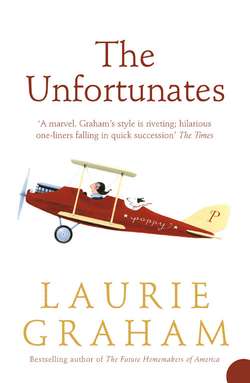Читать книгу The Unfortunates - Laurie Graham - Страница 8
TWO
ОглавлениеMy Grandpa Minkel and his brother Meyer arrived in Great Portage, Minnesota, in 1851 intending to set up as fur traders, but they were too late. The beaver pelt business was finished. They stayed on though and changed their plans and did well enough trading in lumber to build a fine house on top of a hill in Duluth. From Grandpa Minkel’s house you could see clear to Wisconsin. So they said.
Meyer and his wife were never blessed with children. This was somehow due to the accidental firing of a Winchester ’73, but I was never allowed to know the details. So when Grandpa headed south, looking to buy a spread and turn farmer, he left behind one of his own boys, Jesse, as a kind of second-hand son. Gave him away near enough, though he was a grown man and might well have had plans of his own. Grandpa took his other boy, Abe, to Iowa to be a mustard farmer. And that was my Pa.
Uncle Jesse stayed where he was put, married one of the Zukeman girls and had a number of obedient children, plus Cousin Addie, the one who refused to knuckle down to marriage. Grandpa Minkel grew so much mustard he had to buy a factory. Grandma Minkel told him he should make mustard that had a fine flavor but a short life, and she was right. Folks just had to keep coming back for more and Minkel’s Mighty Fine Mustard did so well Grandma and Grandpa had to send Pa to New York City, to invest the profits and keep his finger on the quickening pulse of finance.
My mother’s people were Plotzes. They sold feathers and goose down, in Cedar Rapids. She married Pa in 1890 and came with him to New York soon after, in a delicate condition with my sister Honey. Ma took to her new life as if to the city born. She sent directly for her sister Zillah and fixed her up with Israel Fish, and from then on a veil fell over the Iowa period of their lives. Cedar Rapids had been a mere accident of birth, and was never discussed. As far as Ma and Aunt Fish were concerned everything from the Hudson shore to the Pacific Ocean was nothing but a social wilderness.
Minkel’s Mighty Fine Mustard was to be found on every discerning table and the profits were invested in railroads and mining, and the consequence was Honey and I were mustard heiresses, more or less.
Pa, though, kept his finger on more than the pulse of finance, and was often absent from his own table, indulging, as I had overheard discussed by my mother and Aunt Fish, in ‘a man’s needs’. I understood these to be cigars and blintzes, two things that were not permitted at home. For these comforts Pa went elsewhere. We lived on West 76th Street. My mother bore the impediment of this address as bravely as she could. Pa and Uncle Israel Fish assured her that before too long New York society would abandon their houses on Fifth Avenue and follow her there.
‘We’re setting a trend, Dora,’ Pa used to say.
But my mother didn’t want to set trends. On the steep climb to good society, novelty was one of those hazards that could pitch us all back down where we’d started. Her plan was to keep us as unremarkable as possible. Correct and unremarkable. Let no Minkel be a protruding nail. I don’t think Pa ever appreciated what a close watch Ma kept over our reputation and standing. And no matter how much she protested, he bought that rose pink low-stoop house and encouraged the architect to add as many turrets and finials as could be accommodated.
My aunt, who still lived safely within visiting distance of The Right People, should the call ever come, said, ‘Never fear, Dora. Marriage may be a sacred institution, but if Abe tries to drag you any further into the wilderness, you may depend on having a home with us.’
On evenings when Pa was home, a fire was lit in the library and I was allowed to sit in there with him and look at the things on the shelves of the vitrine. He had a beaver skull, and a rock of fool’s gold, and an Ojibway Indian necklace, and a little silk cap, brought by Grandpa Minkel from Germany. There was a rubber plant, and a stuffed osprey, and books. I was allowed to take them down off the shelf and read them, as long as I sat in a good light and didn’t scowl or screw up my eyes. Careless reading can cause the setting in of ugly, permanent facial lines. For this reason my mother never risked opening a book.
When the lamps and the fire were lit and Pa and I sat, cozily turning the pages, it was the best of times. I hated to hear him clear his throat and take out his watch. It meant my time was nearly up and he was preparing to go out into the night.
‘Pa,’ I’d say, ‘don’t go for a blintz tonight.’
But he’d snap shut his watch case and go anyhow. I wasn’t altogether sure what a blintz was, but I knew Pa’s favorite kind was cherry, and I liked the sound of that. I knew, too, that for the best blintzes you had to go to Delancey Street, a dangerous place teeming with something Ma called ‘the element’. I worried that one of those nights Pa wouldn’t come home. Murdered by ‘the element’, and all for a cherry blintz.
